Piano Sheet Music
 "My audience has developed so that they come to listen and are quiet, Thus I can work in a limited volume range and explore all the subtleties that can happen, which is my favorite part of the music." Kenny Burrell / Jazz Guitar
"My audience has developed so that they come to listen and are quiet, Thus I can work in a limited volume range and explore all the subtleties that can happen, which is my favorite part of the music." Kenny Burrell / Jazz Guitar
Debussy

Achille-Claude Debussy (August 22, 1862 – March 25, 1918) was a French composer. Along with Maurice Ravel, he is considered one of the most prominent figures working within the field of Impressionist music, though he himself intensely disliked the term when applied to his compositions. Debussy was not only among the most important of all French composers but also was a central figure in all European music at the turn of the twentieth century.
Debussy's music virtually defines the transition from late-Romantic music to twentieth century modernist music. In French literary circles, the style of this period was known as Symbolism, a movement that directly inspired Debussy both as a composer and as an active cultural participant.
Debussy's music virtually defines the transition from late-Romantic music to twentieth century modernist music. In French literary circles, the style of this period was known as Symbolism, a movement that directly inspired Debussy both as a composer and as an active cultural participant.
Music theory

Music theory is the study of the practices and possibilities of music. The Oxford Companion to Music describes three interrelated uses of the term "music theory"
Rodolfo Polo Gimenez

Polo Giménez, nombre artístico de Rodolfo Lauro María Giménez, (1904-1969), fue un compositor y pianista, intérprete de música folklórica de Argentina, identificado con las provincias de Córdoba donde se crio y Catamarca, donde vivió de adulto. Está considerado como uno de los precursores del boom del folklore argentino producido a partir de la década de 1950. Es autor de canciones que integran el cancionero folklórico tradicional ,como la célebre zamba "Paisaje de Catamarca". Escribió 77 canciones registradas y un total de unas 350. Murió en 1969 durante el acto de celebración de sus 50 años con la música, en el momento que presentaba su álbum Bodas de oro con la música popular Argentina y su libro De este lado del recuerdo.
Charlie Brown

Charles "Charlie" Brown is the main character in the comic strip Peanuts by Charles M. Schulz.
Glenn Miller Orchestra
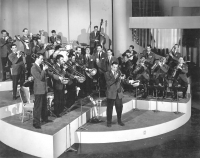
This article is about the band that Glenn Miller fronted. For the band that performed after his disappearance, see Glenn Miller Orchestra (1956–present).
Glenn Miller and His Orchestra
Glenn Miller Band.jpg
Glenn Miller and His Orchestra, on the set of Sun Valley Serenade, 1941
Background information
Genres Dance band, Swing
Years active April 1938 – September 1942
Labels
Bluebird Victor
Website www.glennmiller.com
Past members see members section
Glenn Miller and His Orchestra was an American swing dance band formed by Glenn Miller in 1938. Arranged around a clarinet and tenor saxophone playing melody, and three other saxophones playing harmony, the band became the most popular and commercially successful dance orchestra of the Swing era and one of the greatest singles charting acts of the 20th century.
Miller began professionally recording in New York City as a sideman in the Hot jazz era of the late 1920s. With the arrival of virtuoso trombonists Jack Teagarden and Tommy Dorsey, Miller focused more on developing his arrangement skills. Writing for contemporaries and future stars such as Artie Shaw, and Benny Goodman, Miller gained prowess as an arranger by working in a variety of settings. Later, Miller largely improved his arranging and writing skills by studying under music theorist Joseph Schillinger.
In February 1937, Miller started an orchestra that briefly made records for Decca. With this group, Miller used an arrangement he wrote for British bandleader Ray Noble's American band in an attempt to form a clarinet-reed sound. This style developed over time, and eventually became known as the Glenn Miller sound. Frustrated with his agency over playing inconsistent bookings and lacking broad radio exposure, Miller gave the band notice in December 1937. Less than three months later, he was looking for members and forming a new band.
Miller began a partnership with Eli Oberstein, which led directly to a contract with Victor subsidiary Bluebird Records. Gaining notoriety at such engagements as the Paradise Restaurant and Frank Dailey–owned Meadowbrook and their corresponding nationwide broadcasts, Miller struck enormous popularity playing the Glen Island Casino in the summer of 1939. From late 1939 to mid-1942, Miller was the number-one band in the country, with few true rivals. Only Harry James' band began to equal Miller's in popularity as he wound down his career in the wake of the Second World War. The AFM strike prevented Miller from making any new recordings in the last two months of his band's existence, and they formally disbanded at the end of September 1942.
Miller's short-term chart successes have seldom been duplicated and his group's unprecedented dominance of early Your Hit Parade and Billboard singles charts, resulting in 16 number-one singles and 69 Top Ten hits, foreshadowed future record-breaking chart acts such as Elvis Presley and The Beatles.
Contents
1 Musical success
1.1 Beginnings
1.2 Glen Island Casino and Meadowbrook
1.3 Nationwide popularity
2 Radio success
3 Chart success
4 Past members
5 Discography
5.1 Singles
6 See also
7 References
8 External links
Musical success
Beginnings
By March 1938, Glenn was planning to form a new group. The newly reformed band featured several longtime associates of Miller. From his first orchestra, Miller invited back Hal McIntyre, and hired Paul Tanner, Wilbur Schwartz, Ray Eberle (who was the younger brother of Jimmy Dorsey's vocalist Bob Eberly), and his old friend Chummy MacGregor. Miller's perseverance, business expertise, combined with a penchant for showmanship and musical taste, provided the faith for financiers Mike Nidorf and Cy Shribman. Miller used the 'clarinet-lead' sound as the foundation for his new band, and this caught the attention of students at Northeastern campuses. They opened on April 16, 1938, at Raymor Ballroom in Boston. When the band reached New York, they were billed below Freddie Fisher and His Schnickelfritzers, a dance band comedy routine. From Vincent Lopez's group came Marion Hutton, who added enthusiasm and energy in her performances. On September 7, 1938, the band made their first recordings, "My Reverie", "King Porter Stomp" and "By the Waters of Minnetonka", in two parts. Keeping up radio dates, Miller was only booked for 1 more session the rest of the year.
Glen Island Casino and Meadowbrook
In March 1939, the Glenn Miller Orchestra was given its big break, when they were chosen to play the summer season at the prestigious Glen Island Casino located on the north shore of Long Island Sound in New Rochelle, New York. Frank Dailey, manager of The Meadowbrook Ballroom in Cedar Grove, New Jersey, immediately booked the band for a four-week stay in March and April, before Glen Island. The band was well-received and within days Dailey picked up a three-week extension offer. During this time, Bluebird recording dates became more common and Glenn added drummer Maurice Purtill and trumpeter Dale "Mickey" McMickle to stabilize personnel. Opening at Glen Island on May 17, 1939, the casino's radio broadcast antenna ensured the Miller band was heard around the country. In late August, the end of their summer season, they had nationwide attention.
George T. Simon, writer and one-time drummer for Miller, spoke of the Glen Island broadcasts:
Glen Island was the prestige place for people who listened to bands on radio. The band's first semi hit, "Little Brown Jug", came out just when it opened at Glen Island. That helped. And the clarinet lead in Glenn's arrangements was such a romantic sound! It caught the public fancy during this exposure. Miller began ending his broadcasts from Glen Island with his "Something Old, Something New" medleys. But the most important thing for Glenn's success was that he recorded "In the Mood" while he was at the casino. That made him the Michael Jackson of his day.
Nationwide popularity
Capitalizing on newfound popularity, Miller decided to add a trombone and a trumpet, giving the band a fuller sound. On April 4, 1939, Miller and his orchestra recorded "Moonlight Serenade". Considered one of the top songs of the swing era, and Miller's best composition, it soon became the theme song to start and end all of his radio performances.
Miller's most popular track "In the Mood" was recorded August 1, 1939. Famous for its opening and bass riffs as well as its "dueling" saxophone solos between Tex Beneke and Al Klink, the song hit number one on the Billboard charts, staying for a total of 30 weeks. Joe Garland compiled the song from riffs he'd heard in other songs, and is credited on the label. Elements of "In the Mood" can be found in earlier jazz recordings, such as Jimmy O'Bryant's "Clarinet Getaway", Wingy Manone's "Tar Paper Stomp", and Fletcher Henderson's "Hot and Anxious." Garland put these pieces together and initially offered the song, in a six-minute form, to Artie Shaw. Despite playing it for radio broadcast, Shaw found no success with it in this form. Miller purchased the song in June 1939 and asked Eddie Durham to arrange it for his orchestra, and Miller made final tweaks in Victor studios. In a 2000 interview for npr, trombonist Paul Tanner remembered recording the song and playing it live:
He would say, "You fellas do this, and you fellas do that, and let's hear it once." And then, "We're gonna cut from this spot to this spot in the arrangement, and in here we're gonna put a trumpet solo. And in this spot and this spot we're gonna cut way down here and we're gonna have the two saxophones have a little battle in there," and decided to make cuts. And then at the end, Alice , if you know the arrangement, at the end there are all those false endings that go on, and it kept getting softer and softer until Glenn would give the drummer a clue and he would hit the cowbell and then we would know that the next time we were to come on very loud. And the dancers just loved it. He tried it out on the dances at the Glen Island Casino, and they loved it. They couldn't figure out how we knew when to come in loud. But, you know, I told them, "Well, we have a sixth sense of that sort of thing." But actually, what happened is the drummer hit the cowbell, and we knew the next time was loud. And this was all Glenn's doing.
On February 5, 1940, Miller recorded "Tuxedo Junction", which hit number one and reportedly sold 115,000 copies within the first week of release, and placed 7th overall for the National Hit Parade that year. Bob Eberly said that it "sold 90,000 copies in the first week, at a time when 25,000 was considered a great seller". In April, the band chant track "Pennsylvania 6-5000", referencing the phone number for the Hotel Pennsylvania, which housed the Café Rouge, a common engagement and broadcasting spot for the band, was released and it too became an instant swing standard.
On January 1, 1941, following tensions regarding licensing fees, radio networks banned ASCAP songs from live performance. Miller had to work to reform his radio programs for BMI published tunes, temporarily switching his theme to "Slumber Song". In early 1941, Marion Hutton left the band to go on maternity leave. In the meantime, Miller needed an additional female vocalist, and he offered Dorothy Claire, then with Bobby Byrne's band, twice her salary. Claire went to work for Miller, despite her signature on a three-year contract with Byrne in November 1940, and Miller ignored Byrne's wishes for compensation. Byrne then launched a $25,000 lawsuit against the Miller orchestra's business dealings. Miller met with Byrne in Columbus, Ohio sometime in early March and settled the dispute – Claire went back to working with Byrne's band. Miller soon hired The Modernaires from Paul Whiteman, who was disbanding his orchestra. Still in need of a female vocalist, the wife of Modernaire Hal Dickinson, Paula Kelly, who had sung previously with Al Donahue, stepped up to fill in the role. The signing of the Modernaires significantly benefitted the Miller organization. Hip and popular with young listeners, the Modernaires' vocal range added a new dimension to Miller's recordings.
In late March, Miller and his orchestra began work on their first motion picture, Sun Valley Serenade. Previously, swing films such as Hollywood Hotel with Benny Goodman's orchestra had only featured bands for song performances; Miller reportedly insisted, perhaps even to the extent of contract clauses, that the plot of Sun Valley revolve around the band rather than only feature them. Harry Warren and Mack Gordon were commissioned to write songs for the film. The Miller band filmed and recorded an extended song-and-dance number featuring the Nicholas Brothers for what was soon to be its biggest selling record, surprise hit "Chattanooga Choo Choo". Despite criticism of the plot, Sun Valley Serenade was received with general positivity from critics, and Miller earned praise for his band's role in the film, with Barry Ulanov writing for Metronome:
Miller comes across as a convincing band leader, and, even more important, a convincing human being in this film. He’s on mostly for music, but most of the film is music and the dozen or so reels are a better showcase for the Glenn Miller band than they are for the Sonja Henie torso and limbs, with and without skates. Never has a movie made more of a popular band and never has a movie featuring such an organization presented its music so tastefully... Pictorially, Trigger Alpert and Maurice Purtill take the honors. Trigger hops around like mad and Maurice looks like the movies’ idea of a swing drummer, all right. They stay within the bounds of good taste, however ... the story is believable, and happily centers around the band, so that the whole thing is a triumph for Glenn Miller and the band.
Billboard top 10 chart for January 24, 1942, where Glenn Miller and His Orchestra hold five of the slots.
In October, ASCAP and the radio networks agreed on a new rate, and the band could finally play "Chattanooga" and their other songs on radio. W. Wallace Early, the manager of record sales for RCA Victor and Bluebird Records, presented the first ever gold record to Miller on February 10, 1942, saying:
It's a pleasure to be here tonight. And speaking of RCA Victor, we're mighty proud of that Chattanooga Choo Choo, and the man that made the record, Glenn Miller. You see it's been a long time – 15 years in fact – since any record has sold a million copies. And Chattanooga Choo Choo certainly put on steam and breezed right through that million mark by over 200,000 pressings. And we decided that Glenn should get a trophy. The best one we could think of is a gold record of Chattanooga. And now Glenn, it's yours – with the best wishes of RCA Victor Bluebird Records.
After the Pearl Harbor attack, Miller began incorporating more patriotic themes into his radio shows and recordings.
In early 1942, the band was upgraded from Bluebird to full-price Victor Records. Following very closely in the footsteps of its predecessor, the Miller band started work on their second film, Orchestra Wives in March. Once again, Gordon and Warren were recalled to compose the songs. The previous year, both had composed "At Last" but couldn't place it into Sun Valley Serenade. They worked over the arrangement, and it was displayed prominently in Orchestra Wives. Years later, it became a standard when recorded by Etta James. Akin to "Chattanooga", "(I've Got a Gal In) Kalamazoo" was filmed as a song and dance number featuring the Nicholas Brothers and also sold a million pressings, with Billboard ranking it among the most popular records of the year.
In mid–July, Miller and the band recorded thirteen sides, as James Petrillo, chief of the musicians' union, embarked on a 28-month recording ban. The strike prevented Miller from making additional records in his career, although Victor slowly released the last set of tracks, with "That Old Black Magic" hitting number one in May 1943, over eight months after his band ceased to exist.
Miller began privately sending letters to the Armed Forces in attempts to lead a modern military band. Accepted into the United States Navy and later transferred to the Army Air Forces, in early September he broke the news to the band and later that month they played their last radio shows. Miller surrendered his Chesterfield radio slot to Harry James.
Radio success
Radio played a pivotal role in the success of Miller and His Orchestra. Featured heavily on the format during their existence, many of their earlier programs from such venues as the Paradise Restaurant, Glen Island and the Meadowbrook Ballroom used remote connections to the National Broadcasting Company, on both NBC–Red and NBC–Blue.
The makers of Chesterfield Cigarettes hosted a half-hour radio show on CBS that featured King of Jazz Paul Whiteman. Whiteman decided to retire and recommended Glenn as a replacement. On December 27, 1939, Miller took over the program as Chesterfield Moonlight Serenade. During the first 13 weeks, The Andrews Sisters were featured as Chesterfield were worried over whether Miller could sustain his popularity. Their fear subsided, and the program, reformatted for 15 minutes, aired Tuesday, Wednesday and Thursday nights at 10:15pm. Miller and his band held the slot until their disbandment in 1942.
In 1940, the band broadcast from the first time from the Café Rouge at the Hotel Pennsylvania, soon to become a regular booking and a host of long-term engagements. By then, the Miller band had several NBC sustaining broadcasts in addition to three CBS programs, reaching American homes 6–7 days a week. In August, Miller's orchestra had an hour-long program on NBC–Blue, Glenn Miller's Sunset Serenade featuring prizes Miller paid for out-of-pocket. A review in Billboard commented, "Unusual length of the program allows Miller to display all the top items in his library."
Chart success
According to Paul Albone, of the 121 singles by Glenn Miller and His Orchestra that made the charts, 69 were Top Ten hits, and 16 reached number-one. In just a 4-year career, Miller and His Orchestra's songs spent a cumulative total of 664 weeks, nearly thirteen years, on the charts, 79 of which were at the number-one position. Miller also has the distinction of three posthumous albums reaching number-one on Billboard charts: Glenn Miller in 1945, its follow-up in 1947, and his original recordings repackaged for the release of The Glenn Miller Story in 1954.
Past members
Ray Anthony, who played trumpet with the band from 1940 to 1941, is the last surviving member as of 2019.
Discography
See also: Glenn Miller discography
Singles
Million-selling singles:
1939: "Little Brown Jug"
1939: "Moonlight Serenade"
1939: "In the Mood"
1940: "Tuxedo Junction"
1940: "Pennsylvania 6-5000"
1941: "Chattanooga Choo Choo"
1941: "A String of Pearls"
1941: "Moonlight Cocktail"
1942: "American Patrol"
1942: "(I've Got a Gal In) Kalamazoo"
See also
Glenn Miller
Swing music
Bandleader
Big band
References
"A Portrait of Glenn Miller" (PDF). www.colorado.edu. Glenn Miller Archive.
Gilliland, John (1994). Pop Chronicles the 40s: The Lively Story of Pop Music in the 40s (audiobook). ISBN 978-1-55935-147-8. OCLC 31611854. Tape 2, side A.
"Top Ten Hits 1939-1943" (PDF). colorado.edu. Glenn Miller Archive. September 2017. Retrieved October 12, 2018.
"Captain Swing - Glenn Miller - America in WWII magazine". www.americainwwii.com.
"A Bluebird Reverie – The First RCA Session". 1 April 2014.
Settlemier, Tyrone. "The Online 78 rpm Discographical Project". www.78discography.com.
"POP/JAZZ; GLENN MILLER SOUND OF 1939 AT GLEN ISLAND CASINO".
"Glenn Miller Orchestra – History". glennmillerorchestra.com.
http://ww Archived 2013-07-12 at the Wayback Machine w.glennmiller.com/index.php
"Army Band Hits High Note With Community".
Tsort. "Song title 150 - In the Mood". tsort.info.
""In the Mood"—Glenn Miller (1939)" (PDF). Library of Congress.
Spragg, Dennis. "In the Mood" (PDF). www.colorado.edu. Glenn Miller Archive.
"'In the Mood'". National Public Radio.
Simon, George T. Glenn Miller and His Orchestra. NY: Crowell, 1974.
Spragg, Dennis. "Sun Valley Serenade 75th Anniversary Commemoration" (PDF). Glenn Miller Archive.
Crowther, Bosley. "Sonia Henie in 'Sun Valley Serenade,' a Sparkling and Melodious Outdoor Picture, at the Roxy". The New York Times.
Murrells, Joseph (1978). The Book of Golden Discs (2nd ed.). London: Barrie and Jenkins Ltd. p. 4. ISBN 0-214-20512-6.
"Radio Recordings" (PDF). colorado.edu. Glenn Miller Archive.
Carter, Dick (January 3, 1942). "On the Air: Glenn Miller". Billboard. Retrieved 26 October 2014.
Whitburn, Joel. Pop Memories (1900-1940). Record Research.
Whitburn, Joel (2015). Pop Hits Singles and Albums, 1940-1954. Record Research. ISBN 978-0-89820-198-7.
Popa, Christopher. "Record Sales". Big Band Library.
External links
Wikimedia Commons has media related to Glenn Miller Orchestra.
Website of past vocalist Eileen Burns
YouTube Videos from 1983 GMO US and Japan Tour
vte
Glenn Miller and His Orchestra
Discography Timeline of members, 1938–1942
Number one hits
1939
"Wishing (Will Make It So)" "Stairway to the Stars" "Moon Love" "Over the Rainbow" "The Man With the Mandolin" "Blue Orchids" "In the Mood"
1940
"Tuxedo Junction" "The Woodpecker Song"
1941
"Song of the Volga Boatmen" "Chattanooga Choo Choo" "Elmer's Tune"
1942
"A String of Pearls" "Moonlight Cocktail" "(I've Got a Gal In) Kalamazoo"
1943
"That Old Black Magic"
Albums
Up Swing (1944) Smoke Rings (1944) Glenn Miller (1945) Glenn Miller Masterpieces, Volume II (1947) Glenn Miller Plays Selections From the Film "The Glenn Miller Story" (1954) The Glenn Miller Carnegie Hall Concert (1958) Pure Gold (1975)
Members
Vocalists
Marion Hutton Ray Eberle Tex Beneke Jack Lathrop Ernie Caceres Kay Starr Dorothy Claire Paula Kelly The Modernaires Skip Nelson
Musicians
Al Klink Al Mastren Paul Tanner Toby Tyler Tommy Mack Frank D’Annolfo Howard Gibeling Jimmy Priddy Wilbur Schwartz Stanley Aronson Hal McIntyre Tex Beneke Ernie Caceres Jimmy Abato Gabe Galinas Hal Tennyson Benny Feman Babe Russin Skip Martin Johnny Austin Lou Mucci Bob Price Charlie Hill Legh Knowles Mickey McMickle Clyde Hurley Johnny Best Zeke Zarchy Charles Frankhauser Billy May Ray Anthony Alec Fila Bill Graham Steve Lipkins Allan Reuss Arthur Ens Dick Fisher Jack Lathrop Bobby Hackett Bill Conway Chummy MacGregor Bob Spangler Cody Sandifer Frankie Carlson Maurice Purtill Rollie Bundock Tony Carlson Trigger Alpert Doc Goldberg
Arrangers
Jerry Gray Bill Finegan Glenn Miller Billy May
Composers
Glenn Miller Harry Warren Mack Gordon
Army Air Force
band alumni
The Crew Chiefs Addison Collins Jr. Johnny Desmond Peanuts Hucko Jack Lathrop Norman Leyden Ray McKinley Artie Malvin Ralph Patt Mel Powell George Siravo Charlie Spivak
Media
Films
Sun Valley Serenade (1941) Orchestra Wives (1942) The Glenn Miller Story (1954)
Publications
125 Jazz Breaks for Trombone (1927) Glenn Miller's Method for Orchestral Arranging (1943)
Related
List of songs written by Glenn Miller Dorsey Brothers Orchestra The Glenn Miller Story (Decca) (1954) Glenn Miller Orchestra (1956–present) Glenn Miller Time
Authority control Edit this at Wikidata
ISNI: 0000 0001 1536 8834 MusicBrainz: 9b87c1f6-23ae-469b-b710-ea5da2d3f848
Glenn Miller and His Orchestra
Glenn Miller Band.jpg
Glenn Miller and His Orchestra, on the set of Sun Valley Serenade, 1941
Background information
Genres Dance band, Swing
Years active April 1938 – September 1942
Labels
Bluebird Victor
Website www.glennmiller.com
Past members see members section
Glenn Miller and His Orchestra was an American swing dance band formed by Glenn Miller in 1938. Arranged around a clarinet and tenor saxophone playing melody, and three other saxophones playing harmony, the band became the most popular and commercially successful dance orchestra of the Swing era and one of the greatest singles charting acts of the 20th century.
Miller began professionally recording in New York City as a sideman in the Hot jazz era of the late 1920s. With the arrival of virtuoso trombonists Jack Teagarden and Tommy Dorsey, Miller focused more on developing his arrangement skills. Writing for contemporaries and future stars such as Artie Shaw, and Benny Goodman, Miller gained prowess as an arranger by working in a variety of settings. Later, Miller largely improved his arranging and writing skills by studying under music theorist Joseph Schillinger.
In February 1937, Miller started an orchestra that briefly made records for Decca. With this group, Miller used an arrangement he wrote for British bandleader Ray Noble's American band in an attempt to form a clarinet-reed sound. This style developed over time, and eventually became known as the Glenn Miller sound. Frustrated with his agency over playing inconsistent bookings and lacking broad radio exposure, Miller gave the band notice in December 1937. Less than three months later, he was looking for members and forming a new band.
Miller began a partnership with Eli Oberstein, which led directly to a contract with Victor subsidiary Bluebird Records. Gaining notoriety at such engagements as the Paradise Restaurant and Frank Dailey–owned Meadowbrook and their corresponding nationwide broadcasts, Miller struck enormous popularity playing the Glen Island Casino in the summer of 1939. From late 1939 to mid-1942, Miller was the number-one band in the country, with few true rivals. Only Harry James' band began to equal Miller's in popularity as he wound down his career in the wake of the Second World War. The AFM strike prevented Miller from making any new recordings in the last two months of his band's existence, and they formally disbanded at the end of September 1942.
Miller's short-term chart successes have seldom been duplicated and his group's unprecedented dominance of early Your Hit Parade and Billboard singles charts, resulting in 16 number-one singles and 69 Top Ten hits, foreshadowed future record-breaking chart acts such as Elvis Presley and The Beatles.
Contents
1 Musical success
1.1 Beginnings
1.2 Glen Island Casino and Meadowbrook
1.3 Nationwide popularity
2 Radio success
3 Chart success
4 Past members
5 Discography
5.1 Singles
6 See also
7 References
8 External links
Musical success
Beginnings
By March 1938, Glenn was planning to form a new group. The newly reformed band featured several longtime associates of Miller. From his first orchestra, Miller invited back Hal McIntyre, and hired Paul Tanner, Wilbur Schwartz, Ray Eberle (who was the younger brother of Jimmy Dorsey's vocalist Bob Eberly), and his old friend Chummy MacGregor. Miller's perseverance, business expertise, combined with a penchant for showmanship and musical taste, provided the faith for financiers Mike Nidorf and Cy Shribman. Miller used the 'clarinet-lead' sound as the foundation for his new band, and this caught the attention of students at Northeastern campuses. They opened on April 16, 1938, at Raymor Ballroom in Boston. When the band reached New York, they were billed below Freddie Fisher and His Schnickelfritzers, a dance band comedy routine. From Vincent Lopez's group came Marion Hutton, who added enthusiasm and energy in her performances. On September 7, 1938, the band made their first recordings, "My Reverie", "King Porter Stomp" and "By the Waters of Minnetonka", in two parts. Keeping up radio dates, Miller was only booked for 1 more session the rest of the year.
Glen Island Casino and Meadowbrook
In March 1939, the Glenn Miller Orchestra was given its big break, when they were chosen to play the summer season at the prestigious Glen Island Casino located on the north shore of Long Island Sound in New Rochelle, New York. Frank Dailey, manager of The Meadowbrook Ballroom in Cedar Grove, New Jersey, immediately booked the band for a four-week stay in March and April, before Glen Island. The band was well-received and within days Dailey picked up a three-week extension offer. During this time, Bluebird recording dates became more common and Glenn added drummer Maurice Purtill and trumpeter Dale "Mickey" McMickle to stabilize personnel. Opening at Glen Island on May 17, 1939, the casino's radio broadcast antenna ensured the Miller band was heard around the country. In late August, the end of their summer season, they had nationwide attention.
George T. Simon, writer and one-time drummer for Miller, spoke of the Glen Island broadcasts:
Glen Island was the prestige place for people who listened to bands on radio. The band's first semi hit, "Little Brown Jug", came out just when it opened at Glen Island. That helped. And the clarinet lead in Glenn's arrangements was such a romantic sound! It caught the public fancy during this exposure. Miller began ending his broadcasts from Glen Island with his "Something Old, Something New" medleys. But the most important thing for Glenn's success was that he recorded "In the Mood" while he was at the casino. That made him the Michael Jackson of his day.
Nationwide popularity
Capitalizing on newfound popularity, Miller decided to add a trombone and a trumpet, giving the band a fuller sound. On April 4, 1939, Miller and his orchestra recorded "Moonlight Serenade". Considered one of the top songs of the swing era, and Miller's best composition, it soon became the theme song to start and end all of his radio performances.
Miller's most popular track "In the Mood" was recorded August 1, 1939. Famous for its opening and bass riffs as well as its "dueling" saxophone solos between Tex Beneke and Al Klink, the song hit number one on the Billboard charts, staying for a total of 30 weeks. Joe Garland compiled the song from riffs he'd heard in other songs, and is credited on the label. Elements of "In the Mood" can be found in earlier jazz recordings, such as Jimmy O'Bryant's "Clarinet Getaway", Wingy Manone's "Tar Paper Stomp", and Fletcher Henderson's "Hot and Anxious." Garland put these pieces together and initially offered the song, in a six-minute form, to Artie Shaw. Despite playing it for radio broadcast, Shaw found no success with it in this form. Miller purchased the song in June 1939 and asked Eddie Durham to arrange it for his orchestra, and Miller made final tweaks in Victor studios. In a 2000 interview for npr, trombonist Paul Tanner remembered recording the song and playing it live:
He would say, "You fellas do this, and you fellas do that, and let's hear it once." And then, "We're gonna cut from this spot to this spot in the arrangement, and in here we're gonna put a trumpet solo. And in this spot and this spot we're gonna cut way down here and we're gonna have the two saxophones have a little battle in there," and decided to make cuts. And then at the end, Alice , if you know the arrangement, at the end there are all those false endings that go on, and it kept getting softer and softer until Glenn would give the drummer a clue and he would hit the cowbell and then we would know that the next time we were to come on very loud. And the dancers just loved it. He tried it out on the dances at the Glen Island Casino, and they loved it. They couldn't figure out how we knew when to come in loud. But, you know, I told them, "Well, we have a sixth sense of that sort of thing." But actually, what happened is the drummer hit the cowbell, and we knew the next time was loud. And this was all Glenn's doing.
On February 5, 1940, Miller recorded "Tuxedo Junction", which hit number one and reportedly sold 115,000 copies within the first week of release, and placed 7th overall for the National Hit Parade that year. Bob Eberly said that it "sold 90,000 copies in the first week, at a time when 25,000 was considered a great seller". In April, the band chant track "Pennsylvania 6-5000", referencing the phone number for the Hotel Pennsylvania, which housed the Café Rouge, a common engagement and broadcasting spot for the band, was released and it too became an instant swing standard.
On January 1, 1941, following tensions regarding licensing fees, radio networks banned ASCAP songs from live performance. Miller had to work to reform his radio programs for BMI published tunes, temporarily switching his theme to "Slumber Song". In early 1941, Marion Hutton left the band to go on maternity leave. In the meantime, Miller needed an additional female vocalist, and he offered Dorothy Claire, then with Bobby Byrne's band, twice her salary. Claire went to work for Miller, despite her signature on a three-year contract with Byrne in November 1940, and Miller ignored Byrne's wishes for compensation. Byrne then launched a $25,000 lawsuit against the Miller orchestra's business dealings. Miller met with Byrne in Columbus, Ohio sometime in early March and settled the dispute – Claire went back to working with Byrne's band. Miller soon hired The Modernaires from Paul Whiteman, who was disbanding his orchestra. Still in need of a female vocalist, the wife of Modernaire Hal Dickinson, Paula Kelly, who had sung previously with Al Donahue, stepped up to fill in the role. The signing of the Modernaires significantly benefitted the Miller organization. Hip and popular with young listeners, the Modernaires' vocal range added a new dimension to Miller's recordings.
In late March, Miller and his orchestra began work on their first motion picture, Sun Valley Serenade. Previously, swing films such as Hollywood Hotel with Benny Goodman's orchestra had only featured bands for song performances; Miller reportedly insisted, perhaps even to the extent of contract clauses, that the plot of Sun Valley revolve around the band rather than only feature them. Harry Warren and Mack Gordon were commissioned to write songs for the film. The Miller band filmed and recorded an extended song-and-dance number featuring the Nicholas Brothers for what was soon to be its biggest selling record, surprise hit "Chattanooga Choo Choo". Despite criticism of the plot, Sun Valley Serenade was received with general positivity from critics, and Miller earned praise for his band's role in the film, with Barry Ulanov writing for Metronome:
Miller comes across as a convincing band leader, and, even more important, a convincing human being in this film. He’s on mostly for music, but most of the film is music and the dozen or so reels are a better showcase for the Glenn Miller band than they are for the Sonja Henie torso and limbs, with and without skates. Never has a movie made more of a popular band and never has a movie featuring such an organization presented its music so tastefully... Pictorially, Trigger Alpert and Maurice Purtill take the honors. Trigger hops around like mad and Maurice looks like the movies’ idea of a swing drummer, all right. They stay within the bounds of good taste, however ... the story is believable, and happily centers around the band, so that the whole thing is a triumph for Glenn Miller and the band.
Billboard top 10 chart for January 24, 1942, where Glenn Miller and His Orchestra hold five of the slots.
In October, ASCAP and the radio networks agreed on a new rate, and the band could finally play "Chattanooga" and their other songs on radio. W. Wallace Early, the manager of record sales for RCA Victor and Bluebird Records, presented the first ever gold record to Miller on February 10, 1942, saying:
It's a pleasure to be here tonight. And speaking of RCA Victor, we're mighty proud of that Chattanooga Choo Choo, and the man that made the record, Glenn Miller. You see it's been a long time – 15 years in fact – since any record has sold a million copies. And Chattanooga Choo Choo certainly put on steam and breezed right through that million mark by over 200,000 pressings. And we decided that Glenn should get a trophy. The best one we could think of is a gold record of Chattanooga. And now Glenn, it's yours – with the best wishes of RCA Victor Bluebird Records.
After the Pearl Harbor attack, Miller began incorporating more patriotic themes into his radio shows and recordings.
In early 1942, the band was upgraded from Bluebird to full-price Victor Records. Following very closely in the footsteps of its predecessor, the Miller band started work on their second film, Orchestra Wives in March. Once again, Gordon and Warren were recalled to compose the songs. The previous year, both had composed "At Last" but couldn't place it into Sun Valley Serenade. They worked over the arrangement, and it was displayed prominently in Orchestra Wives. Years later, it became a standard when recorded by Etta James. Akin to "Chattanooga", "(I've Got a Gal In) Kalamazoo" was filmed as a song and dance number featuring the Nicholas Brothers and also sold a million pressings, with Billboard ranking it among the most popular records of the year.
In mid–July, Miller and the band recorded thirteen sides, as James Petrillo, chief of the musicians' union, embarked on a 28-month recording ban. The strike prevented Miller from making additional records in his career, although Victor slowly released the last set of tracks, with "That Old Black Magic" hitting number one in May 1943, over eight months after his band ceased to exist.
Miller began privately sending letters to the Armed Forces in attempts to lead a modern military band. Accepted into the United States Navy and later transferred to the Army Air Forces, in early September he broke the news to the band and later that month they played their last radio shows. Miller surrendered his Chesterfield radio slot to Harry James.
Radio success
Radio played a pivotal role in the success of Miller and His Orchestra. Featured heavily on the format during their existence, many of their earlier programs from such venues as the Paradise Restaurant, Glen Island and the Meadowbrook Ballroom used remote connections to the National Broadcasting Company, on both NBC–Red and NBC–Blue.
The makers of Chesterfield Cigarettes hosted a half-hour radio show on CBS that featured King of Jazz Paul Whiteman. Whiteman decided to retire and recommended Glenn as a replacement. On December 27, 1939, Miller took over the program as Chesterfield Moonlight Serenade. During the first 13 weeks, The Andrews Sisters were featured as Chesterfield were worried over whether Miller could sustain his popularity. Their fear subsided, and the program, reformatted for 15 minutes, aired Tuesday, Wednesday and Thursday nights at 10:15pm. Miller and his band held the slot until their disbandment in 1942.
In 1940, the band broadcast from the first time from the Café Rouge at the Hotel Pennsylvania, soon to become a regular booking and a host of long-term engagements. By then, the Miller band had several NBC sustaining broadcasts in addition to three CBS programs, reaching American homes 6–7 days a week. In August, Miller's orchestra had an hour-long program on NBC–Blue, Glenn Miller's Sunset Serenade featuring prizes Miller paid for out-of-pocket. A review in Billboard commented, "Unusual length of the program allows Miller to display all the top items in his library."
Chart success
According to Paul Albone, of the 121 singles by Glenn Miller and His Orchestra that made the charts, 69 were Top Ten hits, and 16 reached number-one. In just a 4-year career, Miller and His Orchestra's songs spent a cumulative total of 664 weeks, nearly thirteen years, on the charts, 79 of which were at the number-one position. Miller also has the distinction of three posthumous albums reaching number-one on Billboard charts: Glenn Miller in 1945, its follow-up in 1947, and his original recordings repackaged for the release of The Glenn Miller Story in 1954.
Past members
Ray Anthony, who played trumpet with the band from 1940 to 1941, is the last surviving member as of 2019.
Discography
See also: Glenn Miller discography
Singles
Million-selling singles:
1939: "Little Brown Jug"
1939: "Moonlight Serenade"
1939: "In the Mood"
1940: "Tuxedo Junction"
1940: "Pennsylvania 6-5000"
1941: "Chattanooga Choo Choo"
1941: "A String of Pearls"
1941: "Moonlight Cocktail"
1942: "American Patrol"
1942: "(I've Got a Gal In) Kalamazoo"
See also
Glenn Miller
Swing music
Bandleader
Big band
References
"A Portrait of Glenn Miller" (PDF). www.colorado.edu. Glenn Miller Archive.
Gilliland, John (1994). Pop Chronicles the 40s: The Lively Story of Pop Music in the 40s (audiobook). ISBN 978-1-55935-147-8. OCLC 31611854. Tape 2, side A.
"Top Ten Hits 1939-1943" (PDF). colorado.edu. Glenn Miller Archive. September 2017. Retrieved October 12, 2018.
"Captain Swing - Glenn Miller - America in WWII magazine". www.americainwwii.com.
"A Bluebird Reverie – The First RCA Session". 1 April 2014.
Settlemier, Tyrone. "The Online 78 rpm Discographical Project". www.78discography.com.
"POP/JAZZ; GLENN MILLER SOUND OF 1939 AT GLEN ISLAND CASINO".
"Glenn Miller Orchestra – History". glennmillerorchestra.com.
http://ww Archived 2013-07-12 at the Wayback Machine w.glennmiller.com/index.php
"Army Band Hits High Note With Community".
Tsort. "Song title 150 - In the Mood". tsort.info.
""In the Mood"—Glenn Miller (1939)" (PDF). Library of Congress.
Spragg, Dennis. "In the Mood" (PDF). www.colorado.edu. Glenn Miller Archive.
"'In the Mood'". National Public Radio.
Simon, George T. Glenn Miller and His Orchestra. NY: Crowell, 1974.
Spragg, Dennis. "Sun Valley Serenade 75th Anniversary Commemoration" (PDF). Glenn Miller Archive.
Crowther, Bosley. "Sonia Henie in 'Sun Valley Serenade,' a Sparkling and Melodious Outdoor Picture, at the Roxy". The New York Times.
Murrells, Joseph (1978). The Book of Golden Discs (2nd ed.). London: Barrie and Jenkins Ltd. p. 4. ISBN 0-214-20512-6.
"Radio Recordings" (PDF). colorado.edu. Glenn Miller Archive.
Carter, Dick (January 3, 1942). "On the Air: Glenn Miller". Billboard. Retrieved 26 October 2014.
Whitburn, Joel. Pop Memories (1900-1940). Record Research.
Whitburn, Joel (2015). Pop Hits Singles and Albums, 1940-1954. Record Research. ISBN 978-0-89820-198-7.
Popa, Christopher. "Record Sales". Big Band Library.
External links
Wikimedia Commons has media related to Glenn Miller Orchestra.
Website of past vocalist Eileen Burns
YouTube Videos from 1983 GMO US and Japan Tour
vte
Glenn Miller and His Orchestra
Discography Timeline of members, 1938–1942
Number one hits
1939
"Wishing (Will Make It So)" "Stairway to the Stars" "Moon Love" "Over the Rainbow" "The Man With the Mandolin" "Blue Orchids" "In the Mood"
1940
"Tuxedo Junction" "The Woodpecker Song"
1941
"Song of the Volga Boatmen" "Chattanooga Choo Choo" "Elmer's Tune"
1942
"A String of Pearls" "Moonlight Cocktail" "(I've Got a Gal In) Kalamazoo"
1943
"That Old Black Magic"
Albums
Up Swing (1944) Smoke Rings (1944) Glenn Miller (1945) Glenn Miller Masterpieces, Volume II (1947) Glenn Miller Plays Selections From the Film "The Glenn Miller Story" (1954) The Glenn Miller Carnegie Hall Concert (1958) Pure Gold (1975)
Members
Vocalists
Marion Hutton Ray Eberle Tex Beneke Jack Lathrop Ernie Caceres Kay Starr Dorothy Claire Paula Kelly The Modernaires Skip Nelson
Musicians
Al Klink Al Mastren Paul Tanner Toby Tyler Tommy Mack Frank D’Annolfo Howard Gibeling Jimmy Priddy Wilbur Schwartz Stanley Aronson Hal McIntyre Tex Beneke Ernie Caceres Jimmy Abato Gabe Galinas Hal Tennyson Benny Feman Babe Russin Skip Martin Johnny Austin Lou Mucci Bob Price Charlie Hill Legh Knowles Mickey McMickle Clyde Hurley Johnny Best Zeke Zarchy Charles Frankhauser Billy May Ray Anthony Alec Fila Bill Graham Steve Lipkins Allan Reuss Arthur Ens Dick Fisher Jack Lathrop Bobby Hackett Bill Conway Chummy MacGregor Bob Spangler Cody Sandifer Frankie Carlson Maurice Purtill Rollie Bundock Tony Carlson Trigger Alpert Doc Goldberg
Arrangers
Jerry Gray Bill Finegan Glenn Miller Billy May
Composers
Glenn Miller Harry Warren Mack Gordon
Army Air Force
band alumni
The Crew Chiefs Addison Collins Jr. Johnny Desmond Peanuts Hucko Jack Lathrop Norman Leyden Ray McKinley Artie Malvin Ralph Patt Mel Powell George Siravo Charlie Spivak
Media
Films
Sun Valley Serenade (1941) Orchestra Wives (1942) The Glenn Miller Story (1954)
Publications
125 Jazz Breaks for Trombone (1927) Glenn Miller's Method for Orchestral Arranging (1943)
Related
List of songs written by Glenn Miller Dorsey Brothers Orchestra The Glenn Miller Story (Decca) (1954) Glenn Miller Orchestra (1956–present) Glenn Miller Time
Authority control Edit this at Wikidata
ISNI: 0000 0001 1536 8834 MusicBrainz: 9b87c1f6-23ae-469b-b710-ea5da2d3f848
Chopin

Frédéric Chopin (1 March 1810 – 17 October 1849) was a Polish composer and virtuoso pianist of the Romantic period. He is widely regarded as the greatest Polish composer, and ranks as one of music's greatest tone poets.
He was born in the village of Żelazowa Wola, in the Duchy of Warsaw, to a Polish mother and French-expatriate father, and in his early life was regarded as a child-prodigy pianist. In November 1830, at the age of 20, Chopin went abroad; following the suppression of the Polish November Uprising of 1830–31, he became one of many expatriates of the Polish "Great Emigration."
In Paris, he made a comfortable living as a composer and piano teacher, while giving few public performances. A Polish patriot,
Chopin's extant compositions were written primarily for the piano as a solo instrument. Though technically demanding, Chopin's style emphasizes nuance and expressive depth rather than virtuosity. Chopin invented musical forms such as the ballade and was responsible for major innovations in forms such as the piano sonata, waltz, nocturne, étude, impromptu and prelude. His works are mainstays of Romanticism in 19th-century classical music.
He was born in the village of Żelazowa Wola, in the Duchy of Warsaw, to a Polish mother and French-expatriate father, and in his early life was regarded as a child-prodigy pianist. In November 1830, at the age of 20, Chopin went abroad; following the suppression of the Polish November Uprising of 1830–31, he became one of many expatriates of the Polish "Great Emigration."
In Paris, he made a comfortable living as a composer and piano teacher, while giving few public performances. A Polish patriot,
Chopin's extant compositions were written primarily for the piano as a solo instrument. Though technically demanding, Chopin's style emphasizes nuance and expressive depth rather than virtuosity. Chopin invented musical forms such as the ballade and was responsible for major innovations in forms such as the piano sonata, waltz, nocturne, étude, impromptu and prelude. His works are mainstays of Romanticism in 19th-century classical music.
Benny goodman
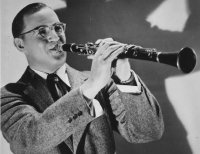
Benjamin David "Benny" Goodman is an American jazz and swing musician and clarinetist. It is known as the "King of Swing." Date of birth: May 30, 1909, Chicago, Illinois, United States Date and place of death: June 13, 1986, Manhattan House, New York, USA
Instrument: Clarinet
Instrument: Clarinet
John Field
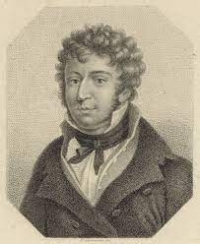
John Field (26 July 1782, baptised 30 September 1782 – 23 January 1837) was an Irish pianist, composer, and teacher. Field is best known as the inventor of the nocturne, but there is evidence to suggest that this is a posthumous accolade. He is mentioned in passing in War and Peace when Countess Rostova calls on the Rostov household musician to play her favourite nocturne.He was born in Dublin into a musical family, and received his early education there, in particular with the immigrant Tommaso Giordani. The Fields soon moved to London, where Field studied under Muzio Clementi. Under his tutelage, Field quickly became a famous and sought-after concert pianist. Together, master and pupil visited Paris, Vienna, and St. Petersburg. Ambiguity surrounds Field's decision to remain in the former Russian capital, but it is likely that Field acted as a sales representative for the Clementi Pianos.
Mac Powell
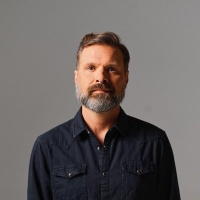
Mac Powell, originally from Clanton, Alabama, is an American singer, songwriter, producer, and musician who formed the Christian rock band Third Day with guitarist Mark Lee, with both of them being the only continuous members of the band prior to their disbandment in 2018.
Alexander Borodin
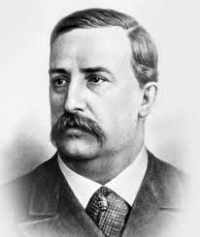
Alexander Porfiryevich Borodin was a Romantic composer and chemist of Georgian-Russian extraction. He was one of the prominent 19th-century composers known as "The Five", a group dedicated to producing a uniquely Russian kind of classical music.
Carl Zeller
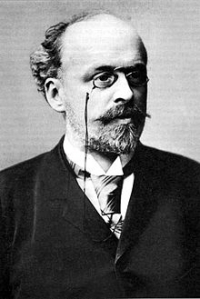
Carl Adam Johann Nepomuk Zeller (19 June 1842 – 17 August 1898) was an Austrian composer of operettas.
Zeller was born in Sankt Peter in der Au, the only child of physician Johann Zeller and Maria Anna Elizabeth. Zeller's father died before his first birthday, after which his mother remarried Ernest Friedinger. In 1875, Zeller married Anna Maria Schwetz.
Zeller was born in Sankt Peter in der Au, the only child of physician Johann Zeller and Maria Anna Elizabeth. Zeller's father died before his first birthday, after which his mother remarried Ernest Friedinger. In 1875, Zeller married Anna Maria Schwetz.
The Beatles

The Beatles were a pop and rock group from Liverpool, England formed in 1960. Primarily consisting of John Lennon (rhythm guitar, vocals), Paul McCartney (bass guitar, vocals), George Harrison (lead guitar, vocals) and Ringo Starr (drums, vocals) throughout their career, The Beatles are recognised for leading the mid-1960s musical "British Invasion" into the United States. Although their initial musical style was rooted in 1950s rock and roll and homegrown skiffle, the group explored genres ranging from Tin Pan Alley to psychedelic rock. Their clothes, styles, and statements made them trend-setters, while their growing social awareness saw their influence extend into the social and cultural revolutions of the 1960s. After the band broke up in 1970, all four members embarked upon solo careers.
The Beatles are one of the most commercially successful and critically acclaimed bands in the history of popular music, selling over a billion records internationally. In the United Kingdom, The Beatles released more than 40 different singles, albums, and EPs that reached number one, earning more number one albums (15) than any other group in UK chart history. This commercial success was repeated in many other countries; their record company, EMI, estimated that by 1985 they had sold over one billion records worldwide. According to the Recording Industry Association of America, The Beatles have sold more albums in the United States than any other band. In 2004, Rolling Stone magazine ranked The Beatles number one on its list of 100 Greatest Artists of All Time. According to that same magazine, The Beatles' innovative music and cultural impact helped define the 1960s, and their influence on pop culture is still evident today. In 2008, Billboard magazine released a list of top-selling Hot 100 artists to celebrate the chart's fiftieth anniversary; The Beatles reached #1 again.
The Beatles are one of the most commercially successful and critically acclaimed bands in the history of popular music, selling over a billion records internationally. In the United Kingdom, The Beatles released more than 40 different singles, albums, and EPs that reached number one, earning more number one albums (15) than any other group in UK chart history. This commercial success was repeated in many other countries; their record company, EMI, estimated that by 1985 they had sold over one billion records worldwide. According to the Recording Industry Association of America, The Beatles have sold more albums in the United States than any other band. In 2004, Rolling Stone magazine ranked The Beatles number one on its list of 100 Greatest Artists of All Time. According to that same magazine, The Beatles' innovative music and cultural impact helped define the 1960s, and their influence on pop culture is still evident today. In 2008, Billboard magazine released a list of top-selling Hot 100 artists to celebrate the chart's fiftieth anniversary; The Beatles reached #1 again.
Axel Christensen
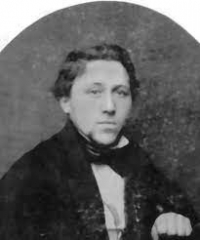
Axel W. Christensen was an important figure in ragtime, not so much as a composer but as a promoter, trying to get the concepts of the music into the hands of the average pianist while making a nice profit at the same time. He was born to Danish immigrants Charles C. Christensen and his bride Mary Mathiasen, in Chicago, Illinois, a decade after the great fire that had leveled the city.
Giovanni Vicari

Giovanni Vicari (1905-1985) was an undisputed mandolin and banjo master, and recorded mazurkas, tangos, and folk melodies from Naples and Sicily, the earliest of which were for Columbia.
Gustav Mahler

Gustav Mahler was an Austrian late-Romantic composer, and one of the leading conductors of his generation. As a composer he acted as a bridge between the 19th century Austro-German tradition and the modernism of the early 20th century.
Mozart

Wolfgang Amadeus Mozart, full name Johann Chrysostom Wolfgang Amadeus Mozart (27 January 1756 â 5 December 1791) was a prolific and influential composer of the Classical era. His over 600 compositions include works widely acknowledged as pinnacles of symphonic, concertante, chamber, piano, operatic, and choral music. Mozart is among the most enduringly popular of classical composers, and many of his works are part of the standard concert repertoire.
Mozart's music, like Haydn's, stands as an archetypal example of the Classical style. His works spanned the period during which that style transformed from one exemplified by the style galant to one that began to incorporate some of the contrapuntal complexities of the late Baroque, complexities against which the galant style had been a reaction. Mozart's own stylistic development closely paralleled the development of the classical style as a whole. In addition, he was a versatile composer and wrote in almost every major genre, including symphony, opera, the solo concerto, chamber music including string quartet and string quintet, and the piano sonata. While none of these genres were new, the piano concerto was almost single-handedly developed and popularized by Mozart. He also wrote a great deal of religious music, including masses; and he composed many dances, divertimenti, serenades, and other forms of light entertainment.
The central traits of the classical style can be identified in Mozart's music. Clarity, balance, and transparency are hallmarks of his work.
Mozart's music, like Haydn's, stands as an archetypal example of the Classical style. His works spanned the period during which that style transformed from one exemplified by the style galant to one that began to incorporate some of the contrapuntal complexities of the late Baroque, complexities against which the galant style had been a reaction. Mozart's own stylistic development closely paralleled the development of the classical style as a whole. In addition, he was a versatile composer and wrote in almost every major genre, including symphony, opera, the solo concerto, chamber music including string quartet and string quintet, and the piano sonata. While none of these genres were new, the piano concerto was almost single-handedly developed and popularized by Mozart. He also wrote a great deal of religious music, including masses; and he composed many dances, divertimenti, serenades, and other forms of light entertainment.
The central traits of the classical style can be identified in Mozart's music. Clarity, balance, and transparency are hallmarks of his work.
Adele

Adele Laurie Blue Adkins (born 5 May 1988 in Enfield, North London), She is the first recipient of the Brit Awards Critics' Choice, which was given to artists who, at the time, had yet to release an album. She debuted at number one with her Mercury Prize nominated debut album 19 in the UK album chart and has since then been certified platinum with sales over 500,000 copies.
Usher

Usher Raymond IV (born October 14, 1978), known simply by his first name Usher, is an American R&B and pop singer-songwriter and actor who rose to fame in the 1990s. To date, he has sold approximately 30 million albums worldwide and has won five Grammy Awards. Usher is a part owner of the Cleveland Cavaliers franchise, and has his own record label, US Records. On September 13, 2008 Usher has been inducted into the All time Hot 100 Artist by the Billboard Hot 100. He is one of the few artists of his generation to be mentioned.
Tori Amos

Tori Amos (born Myra Ellen Amos on August 22, 1963) is a pianist and singer-songwriter of dual British and American citizenship. She is married to English sound engineer Mark Hawley, with whom she has one child, Natashya "Tash" Lórien Hawley, born on September 5, 2000.
Amos was at the forefront of a number of female singer-songwriters in the early 1990s and was noteworthy early in her career as one of the few alternative rock performers to use a piano as her primary instrument. She is known for emotionally intense songs that cover a wide range of subjects including sexuality, religion and personal tragedy. Some of her charting singles include "Crucify", "Silent All These Years", "Cornflake Girl", "Caught a Lite Sneeze", "Professional Widow", "Spark", and "A Sorta Fairytale".
Amos had sold 12 million records worldwide as of 2005 and has also enjoyed a large cult following. Having a history of making eccentric and at times ribald comments during concerts and interviews, she has earned a reputation for being highly idiosyncratic. As a social commentator and sometimes activist, some of the topics she has been most vocal about include feminism, religion, and sexuality.
Amos was at the forefront of a number of female singer-songwriters in the early 1990s and was noteworthy early in her career as one of the few alternative rock performers to use a piano as her primary instrument. She is known for emotionally intense songs that cover a wide range of subjects including sexuality, religion and personal tragedy. Some of her charting singles include "Crucify", "Silent All These Years", "Cornflake Girl", "Caught a Lite Sneeze", "Professional Widow", "Spark", and "A Sorta Fairytale".
Amos had sold 12 million records worldwide as of 2005 and has also enjoyed a large cult following. Having a history of making eccentric and at times ribald comments during concerts and interviews, she has earned a reputation for being highly idiosyncratic. As a social commentator and sometimes activist, some of the topics she has been most vocal about include feminism, religion, and sexuality.
Captain Tsubasa

Captain Tsubasa is a Japanese manga series written and illustrated by Yōichi Takahashi since 1981. The series mainly revolves around the sport of association football focusing on Tsubasa Oozora. The series is characterized by dynamic and exciting football moves, often stylish and implausible.
Chrono Crusade

Chrono Crusade, originally known in Japan as Chrno Crusade (Japanese: クロノクルセイド, Hepburn: Kurono Kuruseido), due to a typo, is a Japanese manga series written and illustrated by Daisuke Moriyama. It was originally published by Kadokawa Shoten in Comic Dragon, then a special issue of the Dragon Magazine. A 24-episode anime television series by Gonzo based on the manga ran from 2003 to 2004 on Fuji TV. The series was released in North America by ADV Manga and ADV Films, titled Chrono Crusade.Set in New York during the 1920s, Chrono Crusade follows the story of Rosette Christopher, and her demon partner Chrono. As members of the Magdalene Order, they travel around the country eliminating demonic threats to society, while Rosette searches for her lost brother, Joshua.
Felix Mendelssohn

Jakob Ludwig Felix Mendelssohn Bartholdy, born, and generally known in English-speaking countries, as Felix Mendelssohn (February 3, 1809 – November 4, 1847) was a German composer, pianist, organist and conductor of the early Romantic period.
The grandson of the philosopher Moses Mendelssohn, he was born into a notable Jewish family, although he himself was brought up initially without religion, and later as a Lutheran. He was recognized early as a musical prodigy, but his parents were cautious and did not seek to capitalise on his abilities. Indeed his father was disinclined to allow Felix to follow a musical career until it became clear that he intended to seriously dedicate himself to it.
Early success in Germany was followed by travel throughout Europe; Mendelssohn was particularly well received in England as a composer, conductor and soloist, and his ten visits there, during which many of his major works were premiered, form an important part of his adult career. His essentially conservative musical tastes however set him apart from many of his more adventurous musical contemporaries such as Liszt, Wagner and Berlioz. The Conservatory he founded at Leipzig became a bastion of this anti-radical outlook.
Mendelssohn's work includes symphonies, concerti, oratorios, piano and chamber music. He also had an important role in the revival of interest in the music of Johann Sebastian Bach. After a long period of relative denigration due to changing musical tastes and antisemitism in the late 19th and early 20th centuries, his creative originality is now being recognized and re-evaluated. He is now among the most popular composers of the Romantic era.
The grandson of the philosopher Moses Mendelssohn, he was born into a notable Jewish family, although he himself was brought up initially without religion, and later as a Lutheran. He was recognized early as a musical prodigy, but his parents were cautious and did not seek to capitalise on his abilities. Indeed his father was disinclined to allow Felix to follow a musical career until it became clear that he intended to seriously dedicate himself to it.
Early success in Germany was followed by travel throughout Europe; Mendelssohn was particularly well received in England as a composer, conductor and soloist, and his ten visits there, during which many of his major works were premiered, form an important part of his adult career. His essentially conservative musical tastes however set him apart from many of his more adventurous musical contemporaries such as Liszt, Wagner and Berlioz. The Conservatory he founded at Leipzig became a bastion of this anti-radical outlook.
Mendelssohn's work includes symphonies, concerti, oratorios, piano and chamber music. He also had an important role in the revival of interest in the music of Johann Sebastian Bach. After a long period of relative denigration due to changing musical tastes and antisemitism in the late 19th and early 20th centuries, his creative originality is now being recognized and re-evaluated. He is now among the most popular composers of the Romantic era.
The Carpenters
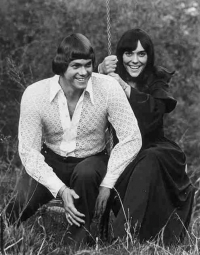
The Carpenters were a vocal and instrumental duo, consisting of siblings Karen and Richard Carpenter. Though often referred to by the public as "The Carpenters", the duo's official name on authorized recordings and press materials is simply "Carpenters", without the definite article. During a period in the 1970s when louder and wilder rock was in great demand, Richard and Karen produced a distinctively soft musical style that made them one of the best-selling music artists of all time.
The Carpenters' melodic pop charted a record-breaking score of hit recordings on the American Top 40 and Adult Contemporary charts, becoming leading sellers in the soft rock, easy listening and adult contemporary genres. The Carpenters had three #1 singles on the Billboard Hot 100 and fifteen #1 hits on the Adult Contemporary Chart (see The Carpenters discography). In addition, they had twelve top 10 singles (including their #1 hits). To date, The Carpenters' album and single sales total more than 100 million units.
During their fourteen-year career, The Carpenters recorded eleven albums, five of which contained top 10 singles (Close to You, Carpenters, A Song for You, Now & Then and Horizon), thirty-one singles, five television specials, and one short-lived television series. They toured in the United States, the United Kingdom, Japan, Australia, the Netherlands and Belgium. Their recording career ended with Karen's death on February 4, 1983. Karen passed away due to a cardiac arrest due to complications of anorexia nervosa. Extensive news coverage of the circumstances surrounding her death increased public awareness of the consequences of eating disorders.
The Carpenters' melodic pop charted a record-breaking score of hit recordings on the American Top 40 and Adult Contemporary charts, becoming leading sellers in the soft rock, easy listening and adult contemporary genres. The Carpenters had three #1 singles on the Billboard Hot 100 and fifteen #1 hits on the Adult Contemporary Chart (see The Carpenters discography). In addition, they had twelve top 10 singles (including their #1 hits). To date, The Carpenters' album and single sales total more than 100 million units.
During their fourteen-year career, The Carpenters recorded eleven albums, five of which contained top 10 singles (Close to You, Carpenters, A Song for You, Now & Then and Horizon), thirty-one singles, five television specials, and one short-lived television series. They toured in the United States, the United Kingdom, Japan, Australia, the Netherlands and Belgium. Their recording career ended with Karen's death on February 4, 1983. Karen passed away due to a cardiac arrest due to complications of anorexia nervosa. Extensive news coverage of the circumstances surrounding her death increased public awareness of the consequences of eating disorders.
Kabalevsky
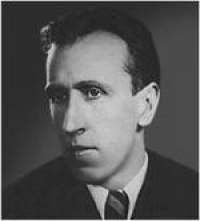
Dmitry Borisovich Kabalevsky (Russian: Дми́трий Бори́сович Кабале́вский; December 30, 1904 – February 18, 1987) was a Russian Soviet composer.
Kabalevsky is regarded as one of the great modern composers of children's music. He helped to set up the Union of Soviet Composers in Moscow and remained one of its leading figures. He was also a prolific composer of piano music and chamber music, many of his piano works have been performed by the likes of Vladimir Horowitz, and are regarded as highly innovative, suffusing influences from jazz structure like that of the latter Nikolai Kapustin and symbolic minimalism along the lines of Alemdar Karamanov's Concerto No. 3 for piano and orchestra.
Kabalevsky is regarded as one of the great modern composers of children's music. He helped to set up the Union of Soviet Composers in Moscow and remained one of its leading figures. He was also a prolific composer of piano music and chamber music, many of his piano works have been performed by the likes of Vladimir Horowitz, and are regarded as highly innovative, suffusing influences from jazz structure like that of the latter Nikolai Kapustin and symbolic minimalism along the lines of Alemdar Karamanov's Concerto No. 3 for piano and orchestra.
Brahms

Johannes Brahms (May 7, 1833 â April 3, 1897) was a German composer of the Romantic period. He was born in Hamburg and in his later years he settled in Vienna, Austria.
Brahms maintained a Classical sense of form and order in his works â in contrast to the opulence of the music of many of his contemporaries. Thus many admirers (though not necessarily Brahms himself) saw him as the champion of traditional forms and "pure music," as opposed to the New German embrace of program music.
Brahms venerated Beethoven: in the composer's home, a marble bust of Beethoven looked down on the spot where he composed, and some passages in his works are reminiscent of Beethoven's style. The main theme of the finale of Brahms's First Symphony is reminiscent of the main theme of the finale of Beethoven's Ninth, and when this resemblance was pointed out to Brahms he replied that any ass â jeder Esel â could see that.
Ein deutsches Requiem was partially inspired by his mother's death in 1865, but also incorporates material from a Symphony he started in 1854, but abandoned following Schumann's suicide attempt. He once wrote that the Requiem "belonged to Schumann". The first movement of this abandoned Symphony was re-worked as the first movement of the First Piano Concerto.
Brahms also loved the Classical composers Mozart and Haydn. He collected first editions and autographs of their works, and edited performing editions. He also studied the music of pre-classical composers, including Giovanni Gabrieli, Johann Adolph Hasse, Heinrich Schütz and especially Johann Sebastian Bach. His friends included leading musicologists, and with Friedrich Chrysander he edited an edition of the works of François Couperin. He looked to older music for inspiration in the arts of strict counterpoint; the themes of some of his works are modelled on Baroque sources, such as Bach's The Art of Fugue in the fugal finale of Cello Sonata No. 1, or the same composer's Cantata No. 150 in the passacaglia theme of the Fourth Symphony's finale.
Brahms maintained a Classical sense of form and order in his works â in contrast to the opulence of the music of many of his contemporaries. Thus many admirers (though not necessarily Brahms himself) saw him as the champion of traditional forms and "pure music," as opposed to the New German embrace of program music.
Brahms venerated Beethoven: in the composer's home, a marble bust of Beethoven looked down on the spot where he composed, and some passages in his works are reminiscent of Beethoven's style. The main theme of the finale of Brahms's First Symphony is reminiscent of the main theme of the finale of Beethoven's Ninth, and when this resemblance was pointed out to Brahms he replied that any ass â jeder Esel â could see that.
Ein deutsches Requiem was partially inspired by his mother's death in 1865, but also incorporates material from a Symphony he started in 1854, but abandoned following Schumann's suicide attempt. He once wrote that the Requiem "belonged to Schumann". The first movement of this abandoned Symphony was re-worked as the first movement of the First Piano Concerto.
Brahms also loved the Classical composers Mozart and Haydn. He collected first editions and autographs of their works, and edited performing editions. He also studied the music of pre-classical composers, including Giovanni Gabrieli, Johann Adolph Hasse, Heinrich Schütz and especially Johann Sebastian Bach. His friends included leading musicologists, and with Friedrich Chrysander he edited an edition of the works of François Couperin. He looked to older music for inspiration in the arts of strict counterpoint; the themes of some of his works are modelled on Baroque sources, such as Bach's The Art of Fugue in the fugal finale of Cello Sonata No. 1, or the same composer's Cantata No. 150 in the passacaglia theme of the Fourth Symphony's finale.
Leonard Cohen
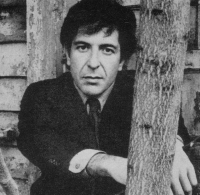
Leonard Norman Cohen, CC, GOQ (born September 21, 1934) is a Canadian singer-songwriter, musician, poet and novelist. Cohen published his first book of poetry in Montreal in 1956 and his first novel in 1963. His work often deals with the exploration of religion, isolation, sexuality and complex interpersonal relationships. Famously reclusive, spending years in a Zen Buddhist monastery, and possessing a persona frequently associated with mystique, he is extremely well-regarded by critics for his literary accomplishments and for producing an output of work of high artistic quality over a five-decade career.
Musically, Cohen's earliest songs (many of which appeared on the 1967 album, Songs of Leonard Cohen) were rooted in European folk music. In the 1970s, his material encompassed pop, cabaret and world music. Since the 1980s his high baritone voice has evolved into lower registers (bass baritone and bass), with accompaniment from a wide variety of instruments and female backing singers.
Over 2,000 renditions of Cohen's songs have been recorded. Cohen has been inducted into both the Canadian Music Hall of Fame and the Canadian Songwriters Hall of Fame and is also a Companion of the Order of Canada, the nation's highest civilian honour. While giving the speech at Cohen's induction into the American Rock and Roll Hall of Fame on March 10, 2008, Lou Reed described Cohen as belonging to the "highest and most influential echelon of songwriters".
Musically, Cohen's earliest songs (many of which appeared on the 1967 album, Songs of Leonard Cohen) were rooted in European folk music. In the 1970s, his material encompassed pop, cabaret and world music. Since the 1980s his high baritone voice has evolved into lower registers (bass baritone and bass), with accompaniment from a wide variety of instruments and female backing singers.
Over 2,000 renditions of Cohen's songs have been recorded. Cohen has been inducted into both the Canadian Music Hall of Fame and the Canadian Songwriters Hall of Fame and is also a Companion of the Order of Canada, the nation's highest civilian honour. While giving the speech at Cohen's induction into the American Rock and Roll Hall of Fame on March 10, 2008, Lou Reed described Cohen as belonging to the "highest and most influential echelon of songwriters".
Evanescence

Evanescence is an American rock band founded in Little Rock, Arkansas in 1995 by singer/pianist Amy Lee and guitarist Ben Moody.
After recording two private EPs and a demo CD named Origin, with the help of Bigwig Enterprises in 2000, the band released their first full-length album, Fallen, on Wind-up Records in 2003. Fallen sold more than 15 million copies worldwide and helped the band win two Grammy Awards. A year later, Evanescence released their first live album, Anywhere but Home, which sold more than one million copies worldwide. In 2006, the band released their second studio album, The Open Door, which has sold more than four million copies.
The band has suffered several line-up changes, including co-founder Moody leaving in 2003, followed by guitarist John LeCompt and drummer Rocky Gray in 2007. Lee is now the only original member of Evanescence remaining in the band.
After recording two private EPs and a demo CD named Origin, with the help of Bigwig Enterprises in 2000, the band released their first full-length album, Fallen, on Wind-up Records in 2003. Fallen sold more than 15 million copies worldwide and helped the band win two Grammy Awards. A year later, Evanescence released their first live album, Anywhere but Home, which sold more than one million copies worldwide. In 2006, the band released their second studio album, The Open Door, which has sold more than four million copies.
The band has suffered several line-up changes, including co-founder Moody leaving in 2003, followed by guitarist John LeCompt and drummer Rocky Gray in 2007. Lee is now the only original member of Evanescence remaining in the band.
Franz Schubert

Franz Peter Schubert (German pronunciation: ; January 31, 1797 – November 19, 1828) was an Austrian composer. He wrote some 600 Lieder, nine symphonies (including the famous "Unfinished Symphony"), liturgical music, operas, some incidental music, and a large body of chamber and solo piano music. He is particularly noted for his original melodic and harmonic writing.
Schubert was born into a musical family, and received formal musical training through much of his childhood. While Schubert had a close circle of friends and associates who admired his work (amongst them the prominent singer Johann Michael Vogl), wide appreciation of his music during his lifetime was limited at best. He was never able to secure adequate permanent employment, and for most of his career he relied on the support of friends and family. He made some money from published works, and occasionally gave private musical instruction. In the last year of his life he began to receive wider acclaim. He died at the age of 31 of "typhoid fever", a diagnosis which was vague at the time; several scholars suspect the real illness was tertiary syphilis.
Interest in Schubert's work increased dramatically in the decades following his death. Composers like Franz Liszt, Robert Schumann and Felix Mendelssohn discovered, collected, and championed his works in the 19th century, as did musicologist Sir George Grove. Franz Schubert is now widely considered to be one of the greatest composers in the Western tradition.
Schubert was born into a musical family, and received formal musical training through much of his childhood. While Schubert had a close circle of friends and associates who admired his work (amongst them the prominent singer Johann Michael Vogl), wide appreciation of his music during his lifetime was limited at best. He was never able to secure adequate permanent employment, and for most of his career he relied on the support of friends and family. He made some money from published works, and occasionally gave private musical instruction. In the last year of his life he began to receive wider acclaim. He died at the age of 31 of "typhoid fever", a diagnosis which was vague at the time; several scholars suspect the real illness was tertiary syphilis.
Interest in Schubert's work increased dramatically in the decades following his death. Composers like Franz Liszt, Robert Schumann and Felix Mendelssohn discovered, collected, and championed his works in the 19th century, as did musicologist Sir George Grove. Franz Schubert is now widely considered to be one of the greatest composers in the Western tradition.
Thomas Moore
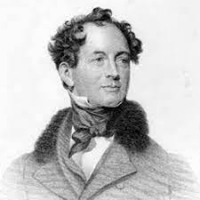
Thomas Moore (28 May 1779 – 25 February 1852) was an Irish writer, poet, and lyricist celebrated for his Irish Melodies. Their setting of English-language verse to old Irish tunes marked the transition in popular Irish culture from Irish to English. Politically, Moore was recognised in England as a press, or "squib", writer for the aristocratic Whigs; in Ireland he was accounted a Catholic patriot. Married to a Protestant actress and hailed as "Anacreon Moore" after the classical Greek composer of drinking songs and erotic verse, Moore did not profess religious piety
Mamas and Papas
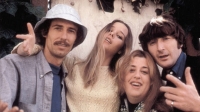
The Mamas & the Papas is an American band. He was active from 1965 to 1968 and has released a total of 5 albums. Although the band appeared in the music market for a short time, it has an important place in the history of music.
They started their music life in Los Angeles, California, USA (1965) Albums: The Papas & The Mamas, MORE
Genres: Folk Rock, Psychedelic Pop, Sunshine pop Awards: Grammy Hall of Fame Award
They started their music life in Los Angeles, California, USA (1965) Albums: The Papas & The Mamas, MORE
Genres: Folk Rock, Psychedelic Pop, Sunshine pop Awards: Grammy Hall of Fame Award
Les Miserable musical
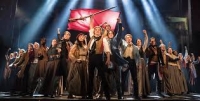
Les Misérables (/leɪ ˌmɪzəˈrɑːb(lə)/; French pronunciation: ), colloquially known in English-speaking countries as Les Mis (/leɪ ˈmɪz/), is a sung-through musical adapted from French poet and novelist Victor Hugo's 1862 novel of the same name by Claude-Michel Schönberg (music), Alain Boublil and Jean-Marc Natel (original French lyrics), and Herbert Kretzmer (English lyrics). The original French musical premiered in Paris in 1980 with direction by Robert Hossein. Its English-language adaptation by producer Cameron Mackintosh ran in London from October 1985 to July 2019, making it the longest-running musical in the West End and the second longest-running musical in the world after the original Off-Broadway run of The Fantasticks.
Schumann

Robert Schumann, sometimes given as Robert Alexander Schumann, (June 8, 1810 – July 29, 1856) was a German composer, aesthete and influential music critic. He is one of the most famous Romantic composers of the 19th century.
He had hoped to pursue a career as a virtuoso pianist, having been assured by his teacher Friedrich Wieck that he could become the finest pianist in Europe after only a few years of study with him. However, a hand injury prevented those hopes from being realized, and he decided to focus his musical energies on composition. Schumann's published compositions were, until 1840, all for the piano; he later composed works for piano and orchestra, many lieder (songs for voice and piano), four symphonies, an opera, and other orchestral, choral and chamber works. His writings about music appeared mostly in the Neue Zeitschrift für Musik ("The New Journal for Music"), a Leipzig-based publication that he jointly founded.
In 1840, after a long and acrimonious legal battle with his piano instructor Friedrich Wieck, Schumann married Wieck's daughter, pianist Clara Wieck, a considerable figure of the Romantic period in her own right. Clara Wieck showcased many works by her husband as well. For the last two years of his life, after an attempted suicide, Schumann was confined to a mental institution.
He had hoped to pursue a career as a virtuoso pianist, having been assured by his teacher Friedrich Wieck that he could become the finest pianist in Europe after only a few years of study with him. However, a hand injury prevented those hopes from being realized, and he decided to focus his musical energies on composition. Schumann's published compositions were, until 1840, all for the piano; he later composed works for piano and orchestra, many lieder (songs for voice and piano), four symphonies, an opera, and other orchestral, choral and chamber works. His writings about music appeared mostly in the Neue Zeitschrift für Musik ("The New Journal for Music"), a Leipzig-based publication that he jointly founded.
In 1840, after a long and acrimonious legal battle with his piano instructor Friedrich Wieck, Schumann married Wieck's daughter, pianist Clara Wieck, a considerable figure of the Romantic period in her own right. Clara Wieck showcased many works by her husband as well. For the last two years of his life, after an attempted suicide, Schumann was confined to a mental institution.
Ludwig Thuille
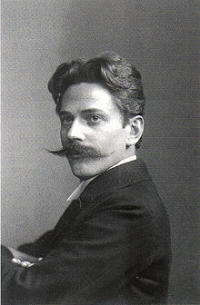
Ludwig Wilhelm Andreas Maria Thuille (Bozen, 30 November 1861 – 5 February 1907) was an Austrian composer and teacher, numbered for a while among the leading operatic composers of the so-called Munich School of composers, whose most famous representative was Richard Strauss.Thuille was born in Bozen, then part of Tyrol, now in Italy.He lost both his parents in 1872 when he was 11, and moved in with his step-uncle in Kremsmünster, Austria. There he sang in the Benedictine choir and studied organ, piano, and violin. His musical abilities were exceptional, so in 1876 the widow of a composer/ conductor, Matthaus Nagiller, took him to Innsbruck for more advanced musical training. There, in the summer of 1877, he met the young Richard Strauss, whose family was visiting the town; the two became lifelong friends.
GEORG PHILLIP TELEMANN
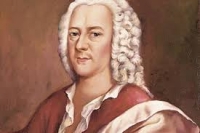
Georg Philipp Telemann (24 March 1681 – 25 June 1767) (German pronunciation: ) was a German Baroque composer and multi-instrumentalist. Almost completely self-taught in music, he became a composer against his family's wishes. After studying in Magdeburg, Zellerfeld, and Hildesheim, Telemann entered the University of Leipzig to study law, but eventually settled on a career in music. He held important positions in Leipzig, Sorau, Eisenach, and Frankfurt before settling in Hamburg in 1721, where he became musical director of that city's five main churches. While Telemann's career prospered, his personal life was always troubled: his first wife died less than two years after their marriage, and his second wife had extramarital affairs and accumulated a large gambling debt before leaving him.
Gérard PRESGURVIC
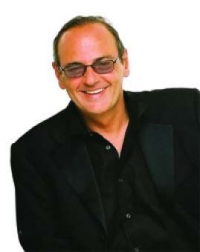
Gérard Presgurvic is a French popular composer. He was the author of 1980s pop hits "Chacun fait c'qui lui plait" and "Marre de cette nana-là", but is best known for the 2001 musical spectacle Roméo et Juliette, de la haine à l'amour.
John Alden Carpenter
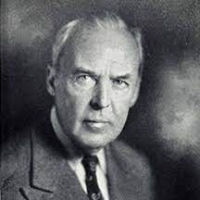
John Alden Carpenter (February 28, 1876 – April 26, 1951) was an American composer.Carpenter was born in Park Ridge, Illinois on February 28, 1876, and raised in a musical household. He was educated at Harvard University, where he studied under John Knowles Paine, and was president of the Glee Club, also writing music for the Hasty-Pudding Club. Showing great promise as a composer, he journeyed to London to study under Edward Elgar, and finally succeeded in studying with him in Rome in 1906, later returning to the United States to study under Bernhard Ziehn in Chicago through 1912. It was there he earned a comfortable living as vice-president of the family business, a shipping supply company, from 1909 to his retirement in 1936. After his retirement, he spent much of his time composing
Dan Gibson
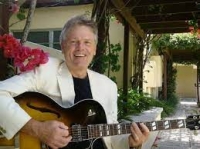
Dan Gibson was a Canadian musician, photographer, cinematographer and sound recordist. During the late 1940s, Dan Gibson took photographs and made nature films, including Audubon Wildlife Theatre. Gibson produced many films and television series through which he learned how to record wildlife sound.
Giovanni Ricordi
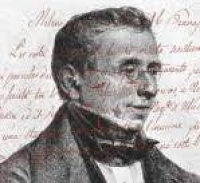
Giovanni Ricordi was an Italian violinist and the founder of the classical music publishing company Casa Ricordi. The musicologist Philip Gossett described him as "a genius and positive force in the history of Italian opera".
Bach

Johann Sebastian Bach (31 March 1685 – 28 July 1750) was a German composer and organist whose sacred and secular works for choir, orchestra, and solo instruments drew together the strands of the Baroque period and brought it to its ultimate maturity. Although he introduced no new forms, he enriched the prevailing German style with a robust contrapuntal technique, an unrivalled control of harmonic and motivic organisation in composition for diverse musical forces, and the adaptation of rhythms and textures from abroad, particularly Italy and France.
Revered for their intellectual depth and technical and artistic beauty, Bach's works include the Brandenburg concertos; the Goldberg Variations; the English Suites, French Suites, Partitas, and Well-Tempered Clavier; the Mass in B Minor; the St. Matthew Passion; the St. John Passion; The Musical Offering; The Art of Fugue; the Sonatas and Partitas for violin solo; the Cello Suites; more than 200 surviving cantatas; and a similar number of organ works, including the celebrated Toccata and Fugue in D Minor.
While Bach's fame as an organist was great during his lifetime, he was not particularly well-known as a composer. His adherence to Baroque forms and contrapuntal style was considered "old-fashioned" by his contemporaries, especially late in his career when the musical fashion tended towards Rococo and later Classical styles. A revival of interest and performances of his music began early in the 19th century, and he is now widely considered to be one of the greatest composers in the Western tradition.
Revered for their intellectual depth and technical and artistic beauty, Bach's works include the Brandenburg concertos; the Goldberg Variations; the English Suites, French Suites, Partitas, and Well-Tempered Clavier; the Mass in B Minor; the St. Matthew Passion; the St. John Passion; The Musical Offering; The Art of Fugue; the Sonatas and Partitas for violin solo; the Cello Suites; more than 200 surviving cantatas; and a similar number of organ works, including the celebrated Toccata and Fugue in D Minor.
While Bach's fame as an organist was great during his lifetime, he was not particularly well-known as a composer. His adherence to Baroque forms and contrapuntal style was considered "old-fashioned" by his contemporaries, especially late in his career when the musical fashion tended towards Rococo and later Classical styles. A revival of interest and performances of his music began early in the 19th century, and he is now widely considered to be one of the greatest composers in the Western tradition.
Aretha Franklin
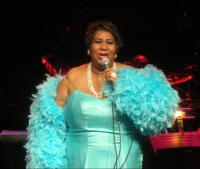
Aretha Louise Franklin (born March 25, 1942) is an American singer, songwriter and pianist self-named and commonly referred to as "The Queen of Soul". Although renowned for her soul recordings, Franklin is also adept at jazz, rock, blues, pop, R&B and gospel. In 2008, the American music magazine Rolling Stone ranked Franklin #1 on its list of The Greatest Singers of All Time.
Franklin is one of the most honored artists by the Grammy Awards, with 20 Grammys to date, which include the Living Legend Grammy and the Lifetime Achievement Grammy. She has scored a total of 20 #1 singles on the Billboard R&B Singles Chart, two of which also became #1 hits on the Billboard Hot 100: "Respect" (1967) and "I Knew You Were Waiting (For Me)" (1987), a duet with George Michael. Since 1961, Franklin has scored a total of 45 "Top 40" hits on the Billboard Hot 100 chart.
In 1987, Franklin became the first female artist to be entered into the Rock and Roll Hall of Fame.
Franklin was the featured singer at the 2009 Presidential inauguration ceremony for Barack Obama.
Franklin is one of the most honored artists by the Grammy Awards, with 20 Grammys to date, which include the Living Legend Grammy and the Lifetime Achievement Grammy. She has scored a total of 20 #1 singles on the Billboard R&B Singles Chart, two of which also became #1 hits on the Billboard Hot 100: "Respect" (1967) and "I Knew You Were Waiting (For Me)" (1987), a duet with George Michael. Since 1961, Franklin has scored a total of 45 "Top 40" hits on the Billboard Hot 100 chart.
In 1987, Franklin became the first female artist to be entered into the Rock and Roll Hall of Fame.
Franklin was the featured singer at the 2009 Presidential inauguration ceremony for Barack Obama.
Cat Stevens
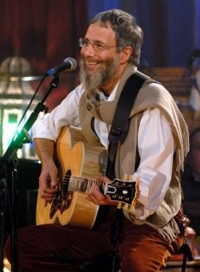
Yusuf Islam, (born Steven Demetre Georgiou on 21 July 1948), best known by his former stage name Cat Stevens, is a British musician of Greek Cypriot and Swedish ancestry. He is a singer-songwriter, multi-instrumentalist, educator, philanthropist and prominent convert to Islam.
As Cat Stevens, he sold over 60 million albums around the world since the late 1960s. His albums Tea for the Tillerman and Teaser and the Firecat were both certified as Triple Platinum by the RIAA in the United States (three million sales each); his album Catch Bull at Four sold half a million copies in the first two weeks of release alone, and was Billboard's number-one LP for three consecutive weeks. His songwriting has also earned him two ASCAP songwriting awards for "The First Cut Is the Deepest," which has been a hit single for five different artists, and has been instrumental for others in establishing their musical careers.
Stevens converted to Islam at the height of his fame in 1977. The following year, he adopted his Muslim name Yusuf Islam, sold all his instruments and awards for charity, and left his music career to devote himself to educational and philanthropic causes in the Muslim community. He turned to his mother to help him decide the best candidate to wed, and thus, in an arranged marriage, took his vows with Fauzia Mubarak Ali, eventually producing five living children from the union.
He has been given several awards for his work in promoting peace in the world, including 2003's World Award, the 2004 Man for Peace award, and the 2007 Mediterranean Prize for Peace. In 2006, he returned to pop music, with his first album of new pop songs in 28 years, entitled An Other Cup.
He lives with his wife, children and grand-child in London. Yusuf Islam spends part of each year in Dubai.
As Cat Stevens, he sold over 60 million albums around the world since the late 1960s. His albums Tea for the Tillerman and Teaser and the Firecat were both certified as Triple Platinum by the RIAA in the United States (three million sales each); his album Catch Bull at Four sold half a million copies in the first two weeks of release alone, and was Billboard's number-one LP for three consecutive weeks. His songwriting has also earned him two ASCAP songwriting awards for "The First Cut Is the Deepest," which has been a hit single for five different artists, and has been instrumental for others in establishing their musical careers.
Stevens converted to Islam at the height of his fame in 1977. The following year, he adopted his Muslim name Yusuf Islam, sold all his instruments and awards for charity, and left his music career to devote himself to educational and philanthropic causes in the Muslim community. He turned to his mother to help him decide the best candidate to wed, and thus, in an arranged marriage, took his vows with Fauzia Mubarak Ali, eventually producing five living children from the union.
He has been given several awards for his work in promoting peace in the world, including 2003's World Award, the 2004 Man for Peace award, and the 2007 Mediterranean Prize for Peace. In 2006, he returned to pop music, with his first album of new pop songs in 28 years, entitled An Other Cup.
He lives with his wife, children and grand-child in London. Yusuf Islam spends part of each year in Dubai.
Yann Tiersen

Guillaume Yann Tiersen (born 23 June 1970) is a French musician and composer known internationally for composing the score to the Jean-Pierre Jeunet movie Amélie. His music is recognized by its use of a large variety of instruments in relatively minimalist compositions, often with a touch of either European classical music or French folk music, using primarily the piano, accordion or violin together with instruments like the melodica, xylophone, toy piano, ondes martenot, harpsichord and typewriter. His musical style is reminiscent of Frédéric Chopin, Erik Satie, Philip Glass and Michael Nyman.
Rachmaninoff

Sergei Vasilievich Rachmaninoff (1 April 1873 - 28 March 1943) was a Russian composer, pianist, and conductor. He was one of the finest pianists of his day and, as a composer, the last great representative of Russian late Romanticism in classical music. Early influences of Tchaikovsky, Rimsky-Korsakov and other Russian composers gave way to a thoroughly personal idiom which included a pronounced lyricism, expressive breadth, structural ingenuity and a tonal palette of rich, distinctive orchestral colors.
Understandably, the piano figures prominently in Rachmaninoff's compositional output, either as a solo instrument or as part of an ensemble. He made it a point, however, to use his own skills as a performer to explore fully the expressive possibilities of the instrument. Even in his earliest works, he revealed a sure grasp of idiomatic piano writing and a striking gift for melody. In some of his early orchestral pieces he showed the first signs of a talent for tone painting, which he would perfect in The Isle of the Dead, and he began to show a similar penchant for vocal writing in two early sets of songs, Opp. 4 and 8. Rachmaninoff's masterpiece, however, is his choral symphony The Bells, in which all of his talents are fused and unified.
Rachmaninoff sometimes felt threatened by the success of modernists such as Scriabin and Prokofiev and wondered whether to cease composing even before he left Russia. His musical philosophy was rooted in the Russian spiritual tradition, where the role of the artist was to create beauty and to speak the truth from the depths of his heart. In his last major interview, in 1941, he admitted his music, like Russian music, was a product of his temperament. He said, on another occasion, "The new kind of music seems to create not from the heart but from the head. Its composers think rather than feel. They have not the capacity to make their works exalt—they meditate, protest, analyze, reason, calculate and brood, but they do not exalt."
Understandably, the piano figures prominently in Rachmaninoff's compositional output, either as a solo instrument or as part of an ensemble. He made it a point, however, to use his own skills as a performer to explore fully the expressive possibilities of the instrument. Even in his earliest works, he revealed a sure grasp of idiomatic piano writing and a striking gift for melody. In some of his early orchestral pieces he showed the first signs of a talent for tone painting, which he would perfect in The Isle of the Dead, and he began to show a similar penchant for vocal writing in two early sets of songs, Opp. 4 and 8. Rachmaninoff's masterpiece, however, is his choral symphony The Bells, in which all of his talents are fused and unified.
Rachmaninoff sometimes felt threatened by the success of modernists such as Scriabin and Prokofiev and wondered whether to cease composing even before he left Russia. His musical philosophy was rooted in the Russian spiritual tradition, where the role of the artist was to create beauty and to speak the truth from the depths of his heart. In his last major interview, in 1941, he admitted his music, like Russian music, was a product of his temperament. He said, on another occasion, "The new kind of music seems to create not from the heart but from the head. Its composers think rather than feel. They have not the capacity to make their works exalt—they meditate, protest, analyze, reason, calculate and brood, but they do not exalt."
Michael Buble

Michael Steven Bublé (born 9 September 1975) is a Canadian big band singer. He won several awards, including a Grammy and multiple Juno Awards. While achieving modest chart success in the United States, his 2003 self-titled album has reached the top ten in Lebanon, the UK and his home country. However, he did find commercial success in the U.S. with his 2005 album It's Time. He has sold over 18 million albums. Michael has also appeared on the TV series Rove four times.
The album Michael Bublé was released by Warner Bros. Records just before Valentine's Day in 2003. The album was actually first released by the Warner company in South Africa, where the album went into the Top 5 and was certified Gold. Soon after that, it entered the Canadian album charts. As success in the USA was marginal at best, Bublé started visiting countries all over the world, with the album being successful in places like the Philippines and Singapore. He then moved on to placed like Italy and eventually had chart success in the UK, U.S., Australia and elsewhere soon followed with the album going Platinum and reaching the top ten of the album charts in the UK and Canada and going all the way to #1 in Australia. The album has reached the top 50 of the Billboard 200 album charts in the U.S. His version of George Michael's "Kissing a Fool" was released as a single from the album and reached the top 30 of the Billboard Hot Adult Contemporary Tracks chart. "How Can You Mend a Broken Heart?" reached the top 30 of the Billboard Adult Contemporary chart as well. His third single "Sway" also reached the top 30 of the Adult Contemporary chart, while a Junkie XL remix of the song reached the top 20 in Australia in May 2004.
Bublé's second studio album, It's Time, debuted as a hugely successful performance. The album reached number 7 on the Billboard 200 album chart and number 2 on the ARIA Album Charts in Australia. It's Time also debuted at number 4 on the UK Album Charts. The album features covers of Beatles and Ray Charles songs, and the hit single "Home".
The album Michael Bublé was released by Warner Bros. Records just before Valentine's Day in 2003. The album was actually first released by the Warner company in South Africa, where the album went into the Top 5 and was certified Gold. Soon after that, it entered the Canadian album charts. As success in the USA was marginal at best, Bublé started visiting countries all over the world, with the album being successful in places like the Philippines and Singapore. He then moved on to placed like Italy and eventually had chart success in the UK, U.S., Australia and elsewhere soon followed with the album going Platinum and reaching the top ten of the album charts in the UK and Canada and going all the way to #1 in Australia. The album has reached the top 50 of the Billboard 200 album charts in the U.S. His version of George Michael's "Kissing a Fool" was released as a single from the album and reached the top 30 of the Billboard Hot Adult Contemporary Tracks chart. "How Can You Mend a Broken Heart?" reached the top 30 of the Billboard Adult Contemporary chart as well. His third single "Sway" also reached the top 30 of the Adult Contemporary chart, while a Junkie XL remix of the song reached the top 20 in Australia in May 2004.
Bublé's second studio album, It's Time, debuted as a hugely successful performance. The album reached number 7 on the Billboard 200 album chart and number 2 on the ARIA Album Charts in Australia. It's Time also debuted at number 4 on the UK Album Charts. The album features covers of Beatles and Ray Charles songs, and the hit single "Home".
Chick Corea

Armando Anthony "Chick" Corea (born June 12, 1941) is a multiple Grammy Award-winning American jazz pianist, keyboardist, drummer, and composer.
He is known for his work during the 1970s in the genre of jazz fusion. He participated in the birth of the electric fusion movement as a member of Miles Davis' band in the 1960s, and in the 1970s formed Return to Forever.
He continued to pursue other collaborations and explore various musical styles throughout the 1980s and 1990s. He is also known for promoting Scientology.
He is known for his work during the 1970s in the genre of jazz fusion. He participated in the birth of the electric fusion movement as a member of Miles Davis' band in the 1960s, and in the 1970s formed Return to Forever.
He continued to pursue other collaborations and explore various musical styles throughout the 1980s and 1990s. He is also known for promoting Scientology.
peter washington
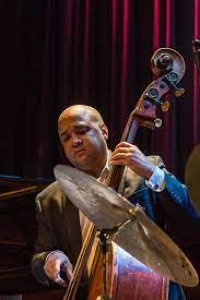
Peter Washington (born in Los Angeles on August 28, 1964) is a jazz double bassist. He played with the Westchester Community Symphony at the age of 14. Later he played electric bass in rock bands. He attended the University of California, Berkeley, where he majored in English Literature, and performed with the San Francisco Youth Symphony and the UC Symphony Orchestra. His growing interest in jazz led him to play with John Handy, Bobby Hutcherson, Harold Land, Frank Morgan, Ernestine Anderson, Chris Connor and other Bay Area luminaries.
KCM (singer)

Kang Chang-mo (Hangul: 강창모; born January 26, 1982), better known by his stage name KCM (Hangul: 케이씨엠), is a South Korean singer. He debuted in 2003 with the song "I Know," from the soundtrack to the Korean drama, Punch (Hangul: 때려).
Ingrid Michaelson

Ingrid Michaelson (born 1979) is a New York-based indie-pop singer-songwriter, probably best known for her single The Way I Am. Her music has been featured in episodes of several popular television shows, including Grey's Anatomy and One Tree Hill, as well as in Old Navy's Fall 2007 Fair Isle advertising campaign.
She is a graduate of Staten Island Technical High School and Binghamton University, where she received a degree in theater. Her time at Binghamton is both mentioned and the backdrop for the song, "The Hat." She grew up doing a musical theater group called "Kids On Stage". Later in life she became director until she decided to pursue her career in music. On September 10, 2008, she opened for Dave Matthews Band's Stand Up for a Cure charity show at Madison Square Garden. Her set included Die Alone, Breakable, Overboard, Be OK, The Way I Am, Locked Up and some playful covers of Ice Ice Baby and The Fresh Prince of Bel-Air Theme song. She closed her set with a solo acoustic performance of Over the Rainbow in tribute to the late DMB saxophonist LeRoi Moore.
She is a graduate of Staten Island Technical High School and Binghamton University, where she received a degree in theater. Her time at Binghamton is both mentioned and the backdrop for the song, "The Hat." She grew up doing a musical theater group called "Kids On Stage". Later in life she became director until she decided to pursue her career in music. On September 10, 2008, she opened for Dave Matthews Band's Stand Up for a Cure charity show at Madison Square Garden. Her set included Die Alone, Breakable, Overboard, Be OK, The Way I Am, Locked Up and some playful covers of Ice Ice Baby and The Fresh Prince of Bel-Air Theme song. She closed her set with a solo acoustic performance of Over the Rainbow in tribute to the late DMB saxophonist LeRoi Moore.
Ennio Morricone
Ennio Morricone, OMRI (born November 10, 1928), is an Italian composer and conductor. He has composed and arranged scores for more than 500 film and television productions. Morricone is considered as one of the most influential film composers since the late 1950s. He is well-known for his long-term collaborations with international acclaimed directors such as Sergio Leone, Brian De Palma, Barry Levinson, and Giuseppe Tornatore.
He wrote the characteristic film scores of Leone's Spaghetti Westerns A Fistful of Dollars (1964), For a Few Dollars More (1965), The Good, the Bad and the Ugly (1966), Once Upon a Time in the West (1968), The Great Silence (1968), and My Name Is Nobody (1973). In the 80s, Morricone composed the scores for John Carpenter's horror movie The Thing (1982), Leone's Once Upon a Time in America (1984), Roland Joffé's The Mission (1986), Brian De Palma's The Untouchables (1987) and Giuseppe Tornatore's Cinema Paradiso (1988).
His more recent compositions include the scores for Oliver Stone's U Turn (1997), Tornatore's The Legend of 1900 (1998) and Malèna (2000), Mission to Mars (2000) by Brian De Palma, Fateless (2005), and Baaria - La porta del vento (2009). Ennio Morricone has won two Grammy Awards, two Golden Globes and five Anthony Asquith Awards for Film Music by BAFTA in 1979–1992. He has been nominated for five Academy Awards for Best Music, Original Score in 1979–2001. Morricone received the Honorary Academy Award in 2007 "for his magnificent and multifaceted contributions to the art of film music". He was the second composer to receive this award after its introduction in 1928.
He wrote the characteristic film scores of Leone's Spaghetti Westerns A Fistful of Dollars (1964), For a Few Dollars More (1965), The Good, the Bad and the Ugly (1966), Once Upon a Time in the West (1968), The Great Silence (1968), and My Name Is Nobody (1973). In the 80s, Morricone composed the scores for John Carpenter's horror movie The Thing (1982), Leone's Once Upon a Time in America (1984), Roland Joffé's The Mission (1986), Brian De Palma's The Untouchables (1987) and Giuseppe Tornatore's Cinema Paradiso (1988).
His more recent compositions include the scores for Oliver Stone's U Turn (1997), Tornatore's The Legend of 1900 (1998) and Malèna (2000), Mission to Mars (2000) by Brian De Palma, Fateless (2005), and Baaria - La porta del vento (2009). Ennio Morricone has won two Grammy Awards, two Golden Globes and five Anthony Asquith Awards for Film Music by BAFTA in 1979–1992. He has been nominated for five Academy Awards for Best Music, Original Score in 1979–2001. Morricone received the Honorary Academy Award in 2007 "for his magnificent and multifaceted contributions to the art of film music". He was the second composer to receive this award after its introduction in 1928.
Keith Lancaster

Keith Lancaster is a singer, songwriter, composer, producer and executive at The Acappella Company.In 1982, Lancaster began pursuit of his dream to spread the Gospel through a cappella music by creating Acappella Ministries in his hometown of Paris, Tennessee. Through this ministry, a quartet was formed, that ultimately became known as the musical group Acappella.
Gundam Wing

Mobile Suit Gundam Wing, also known in Japan as New Mobile Report Gundam Wing (新機動戦記ガンダムW(ウイング), Shin Kidō Senki Gandamu Wingu), is a 1995 Japanese mecha anime series directed by Masashi Ikeda and written by Katsuyuki Sumizawa. It is the sixth installment in the Gundam franchise, taking place in the "After Colony" timeline. As with the original series, the plot of Gundam Wing centers on a war in the future (specifically, After Colony 195) between Earth and its orbital colonies in the Earth-Moon system.The series aired in Japan on the terrestrial TV Asahi network. It ran for 49 episodes, beginning on April 7, 1995 and ending on March 29, 1996. It received multiple manga adaptations, as well as video games. Four original video animation (OVA) episodes were produced including a retelling of the series, Operation Meteor, and a direct sequel, Endless Waltz. In 2010, Sumizawa started writing the novel Frozen Teardrop, another sequel to the series. While the series fared modestly well in Japan, it found greater success in the United States and popularized the Gundam franchise in the West.
Are We There Yet?

ARE WE THERE YET? is a roller coaster ride through the lives of modern American families. This merry musical romp includes everything from hysterical family car trips and mothers praying for hits at their sons' baseball games, to fathers sitting through balley lessons and the joy of sex after 60.
Five for Fighting
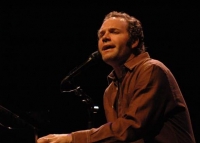
Five for Fighting is the stage name of American singer-songwriter John Ondrasik. His 2000 album America Town went platinum in the U.S. largely due to the success of the song "Superman (It's Not Easy)" following the September 11 attacks in 2001. The 2004 album The Battle for Everything has also enjoyed chart success in the United States. Ondrasik has also released a DualDisc of his 2004 album which has one side containing The Battle for Everything in its entirety and the other side being a DVD containing bonus footage and the "100 Years" music video. Five for Fighting's fourth album, Two Lights, was released on August 1, 2006.
Carrie Underwood
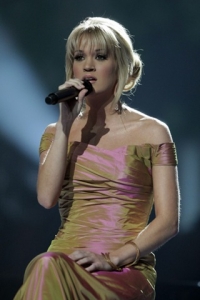
Carrie Marie Underwood (born March 10, 1983 in Muskogee, Oklahoma) is an American country singer-songwriter. She rose to fame as the winner of the fourth season of American Idol, and has become a multi-platinum selling recording artist and a multiple Grammy Award winner. Her debut album, Some Hearts, was certified seven times platinum and is the fastest selling debut country album in Nielsen SoundScan history.
Her second album, Carnival Ride, was released on October 23, 2007. It has so far sold about 2 million copies To date, Underwood has sold over 11 million records in the United States. Underwood was inducted as a member of the Grand Ole Opry on May 10, 2008.
Her second album, Carnival Ride, was released on October 23, 2007. It has so far sold about 2 million copies To date, Underwood has sold over 11 million records in the United States. Underwood was inducted as a member of the Grand Ole Opry on May 10, 2008.
Maria Grever
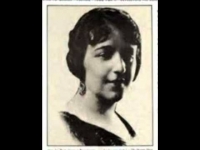
María Grever was the first female Mexican composer to achieve international acclaim. She is best known for the song "What A Difference A Day Makes", which was popularized by Dinah Washington and has been covered by numerous artists.
 Sheet Music Max is a site for those who wants to access popular sheet music easily,
letting them download the sheet music for free for trial purposes.
It's completely free to download and try the listed sheet music, but you have to delete the files after 24 hours of trial.
Don't forget, if you like the piece of music you have just learned playing,
treat the artist with respect, and go buy the original sheet music.
Sheet Music Max is a site for those who wants to access popular sheet music easily,
letting them download the sheet music for free for trial purposes.
It's completely free to download and try the listed sheet music, but you have to delete the files after 24 hours of trial.
Don't forget, if you like the piece of music you have just learned playing,
treat the artist with respect, and go buy the original sheet music.
